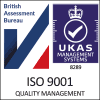A Brief Look at Regulations
Industry standards are codes and rules written by industry professionals, which have been approved by a recognised body or organisation.
Standards are usually the level of work required to fulfil a particular job. Today we’re going to look at some of the electrical industry standards and briefly identify what they mean.
17th Edition
The 17th Edition Wiring Regulations are very important to electrical contractors and are used as a benchmark to test knowledge and understanding of the industry. Training courses are conducted in 17th Edition to help ensure that electrical contractors know how to apply and work to 17th Edition standards and also to allow them to prove they are capable of working to this level.
17th Edition was first launched in January 2008 and became enforceable from the 1st July 2008. Amendment one to 17th Edition was published on the first of July 2011 and came into force in January 2012.
It has been said that the Wiring Regulations should be treated as an electrician’s ‘bible’.
The Electricity at Work Regulations
These regulations bind all employers to a set of rules and ensure that employees are taken care of regarding their health and safety whilst at work. They state that employers have a duty of care to their workers and should properly manage the electrical systems in their workplace. The Electricity at Work Regulations cover things like the design, installation, construction, operation and maintenance of electrical systems within a building.
It is essential that electricians are familiar with these regulations and courses are available for those wanting help understanding the implications of the Electricity at Work Regulations.
These regulations came into force on the first of April 1990 and they cover employers in all industries not just electrical. Inspection and testing is carried out in order to ensure continued compliance with these regulations.
Part P
Part P of the Building Regulations covers the safety of electrical installations and states that all installations must be safe.
It applies to fixed electrical installations in dwellings and often, electrical contractors will carry out work such as; electrical work in bathrooms and kitchens, and installing new circuits.
Part P regulations also mean that installations are subject to notification to a building control body who will inspect the work carried out to ensure that it complies with the Building Regulations.
However, there is a system in place called the ‘Part P Competent Person Scheme’ which means that those registered under this scheme can self certify that their work complies with the Building Regulations. This is done as it would take a long time to call out a Building Inspector.
Part P has been in the news recently as the government and relevant bodies have been reviewing it. They are going to streamline the current system and make it a more efficient system. However, these changes are not yet in place.
Written by Sara Thomson







